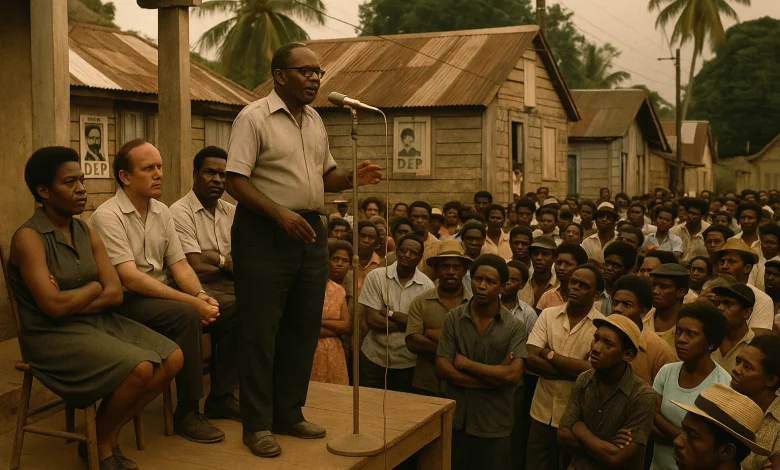1975 General Elections in Dominica

The 1975 General Elections in Dominica were held on 24 July 1975 during the Associated Statehood period, marking a decisive contest between the ruling Dominica Labour Party and a rising opposition led by the Dominica Freedom Party, alongside smaller parties and independent candidates.
Political Context of the 1975 General Elections in Dominica
Dominica’s 1975 General Elections were held at a pivotal moment in the political evolution. Dominica, still a British Associated State at the time, was three years away from achieving full independence in 1978. The elections occurred against a background of heightened political tensions, rising social demands, and an electorate eager for reform. Issues such as land distribution, access to education, healthcare expansion, and stronger self-governance dominated the public debate. strong challenges from the Dominica Freedom Party (DFP) under Dame Mary Eugenia Charles and the Progressive Labour Party (PLP) under Jenner Armour.
Participating Political Parties and Leaders
Several political organizations contested the 1975 elections, reflecting the diversity of ideologies on the island:
- Dominica Labour Party (DLP) – Led by Patrick John, campaigning on infrastructure development, employment, and industrial expansion.
- Dominica Freedom Party (DFP) – Led by Dame Mary Eugenia Charles, emphasizing transparency, anti-corruption, democratic accountability, and protection of civil liberties.
- Progressive Labour Party (PLP) – Led by Jenner Armour, which advocated for workers’ rights, small business development, and more equitable economic reforms.
- Independent Candidates – Several contested in constituencies, often focusing on local community issues rather than broader ideological platforms.
This multiparty contest gave the electorate a broad range of choices, making the 1975 elections one of the most competitive of the Associated State era.
Election Results Overview
The official results of the 1975 General Elections were declared by the Electoral Office. Out of 21 electoral districts, the Dominica Labour Party (DLP) secured a clear majority, winning 16 seats. The Dominica Freedom Party (DFP) won 3 seats, while 2 seats went to Independents.
- Total constituencies contested: 21
- Winning party: Dominica Labour Party (16 seats)
- Other results: DFP (3 seats), Independents (2 seats)
This victory cemented Patrick John’s position as Premier, setting the stage for his leadership into the independence negotiations of the late 1970s.
Constituency-Level Results
While detailed constituency-level data is extensive, here is a snapshot of selected constituencies:
These results reflect the widespread support for the DLP across various regions.
Notable Outcomes and Analysis
The 1975 elections marked several turning points in Dominican politics:
- DLP dominance: With 16 seats, the Dominica Labour Party consolidated power, strengthening Patrick John’s authority.
- Rise of Eugenia Charles: Although her DFP secured only 2 seats, Dame Eugenia Charles established herself as a national political figure. She would later become Dominica’s first female Prime Minister in 1980.
- Independents’ relevance: Winning two constituencies, independent candidates demonstrated strong personal followings, reflecting local dynamics that shaped constituency politics.
Electoral Integrity and Observations
The 1975 elections were conducted under the Constitution of 1967, which established Dominica as an Associated State with internal self-government. Reports from observers and the press described the elections as generally free and fair, though complaints arose concerning campaign financing, intimidation in some constituencies, and the influence of state resources on the campaign. Voter turnout was recorded at around 79%, reflecting the high level of political engagement among the Dominican electorate.
Closing Reflection
That election in Dominica set the political stage for the nation’s final years under Associated Statehood and directly shaped the trajectory toward independence in 1978. Patrick John’s government gained a dominant position, but the seeds of opposition leadership under Eugenia Charles also began to take root. The elections remain significant not only for their results but also for the way they reflected Dominica’s democratic resilience and the electorate’s growing demand for transparency and accountable governance.




